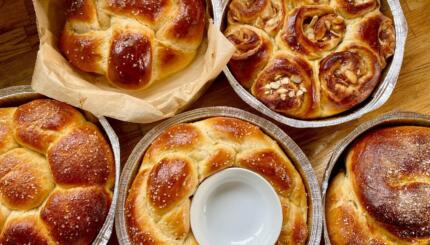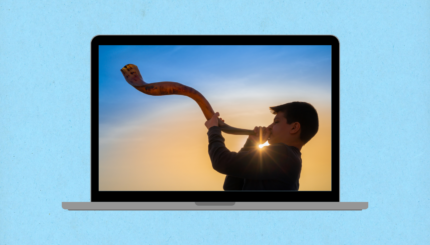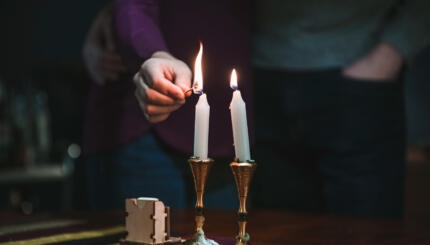As the only Jewish kid in his middle school in suburban Mississippi, my youngest son Eric will be telling his friends why he won’t be at school Monday. He’ll say he won’t be there “because it’s Rosh Hashanah.”
And inevitably, the follow up question from his fellow 6th graders will be: “What’s that?”
I can just imagine the conversation continuing from there…
Well, it’s the Jewish New Year.
New Year? So does that mean it’s like New Year’s Eve, and you stay up late, and at midnight say ‘Happy New Year!’?
Well, no, not really.
Does it have anything to do with Chanukah? Oooh! Do you play the dreidel game? Do you eat those good chocolate coins?
No, it has nothing to do with that.
I thought about how to respond. The questions were about to hit hard and fast, and as his mom, it’s my job to coach Eric and make sure he knows what to say. I want him to be prepared. Which meant I needed to be prepared, and I am embarrassed to say… I had to look it up.
I mean, of course I know what Rosh Hashanah is. I certainly know how to prepare the holiday dinner. I know what to say and do during services. I know the prayers, I know about saying I’m sorry, I know about the reflection … but I guess I was looking for the Cliff notes (Sparknotes?) version for what Rosh Hashanah “is”.
So at first, I went to my go-to reference guide, Joseph Telushkin’s wonderful Jewish Literacy book, and discovered the following information: “On Rosh Hashanah and Yom Kippur, Jews are instructed to scrupulously examine their deeds and more significantly their misdeeds during the preceding year. During these days, Jewish tradition teaches, God decides who shall live and who shall die during the coming year. The prayers that we say attempt to influence God’s decisions.”
This is pretty heavy stuff. Who shall live and who shall die. I have said those words every year since I began attending the adult service (let’s just say it’s been more than 30 years) and I never internalized those words – who shall live and who shall die.
Hmmm. Meaningful, yes, but not necessarily what I would advise Eric to tell his peers. “What’s Rosh Hoshanah? Oh, okay. Well. It’s basically when God decides who’s gonna live and who’s gonna die.”
So I went to the next great resource I had on hand – the ISJL pre-K curriculum. And you know what? In this particular situation, I think I prefer the early-childhood explanation: “During Rosh Hashanah, we think about how we want the new year to be better. We reflect on the past year – at both the good things and the bad things. At the new year we get a chance to start over fresh and make every effort to be a better person.”
As Telushkin admits, the theme of life and death could easily have turned Rosh Hashanah into two days of utter morbidity. To prevent this, the rabbis encouraged Jews to observe Rosh Hashanah in a spirit of optimism, confident that God will accept their repentance and extend their lives. For example, they ordained that honey be served at all Rosh Hashanah meals and that slices of apple be dipped into it. A special prayer is then recited: May it be Thy will, O Lord, Our God, to grant us a year that is good and is sweet.
That’s more in line with what I hope Eric’s classmates will learn when they ask him about our holiday. It’s a day of fresh starts. A season when we ask for a good and sweet year to come. (And if you need more resources on what Rosh Hashanah is, there are plenty of great ones here, too!)
L’shana tova!
dreidel
Pronounced: DRAY-dul, Origin: Yiddish, a spinning top, with four sides, each marked with a different Hebrew letter (nun, gimel, hay and shin), it is played with on Hanukkah.
Rosh Hashanah
Pronounced: roshe hah-SHAH-nah, also roshe ha-shah-NAH, Origin: Hebrew, the Jewish new year.



